|
|
|
Sort Order |
|
|
|
Items / Page
|
|
|
|
|
|
|
| Srl | Item |
| 1 |
ID:
144798
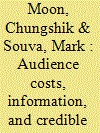

|
|
|
|
|
| Summary/Abstract |
Leaders who can accumulate audience costs can send costly signals that may help alleviate information problems associated with crisis escalation. We argue that research examining the effect of audience costs fails to appreciate the theoretical context in which audience costs matter. Audience costs may help alleviate information problems associated with international conflict. However, credible commitment problems are more central than information problems for some international conflicts. Theory does not expect audience costs to matter in this context; as a result, extant tests, and many criticisms, of the effect of audience costs on crisis escalation are flawed. We offer a more appropriate test of the effect of audience costs on crisis escalation. Consistent with extant theoretical arguments, we find that audience costs only reduce the likelihood of conflict when credible commitment problems are not the dominant concern motivating a dispute or crisis.
|
|
|
|
|
|
|
|
|
|
|
|
|
|
|
|
| 2 |
ID:
167282


|
|
|
|
|
| Summary/Abstract |
Can a leader reduce the audience costs imposed for backing down completely on a threat by opting instead to ‘back up’ to a less hawkish policy? Current research examines the political repercussions of making a threat and then taking no action at all. Real world leaders, however, often ‘back up’ and implement policies that involve some action – for instance, imposing sanctions after threatening military force, rather than backing down entirely. This article argues that audience costs can be mitigated through policy substitution: backing up to less hawkish policies – that reduce inconsistency between a leader’s words and deeds – may reduce audience costs. A series of original survey experiments finds support for the argument and demonstrates that the population treats inconsistency as a continuum. The findings have implications for domestic politics and crisis bargaining. Domestically, a leader who backs up faces lower audience costs and is seen as more competent than one who backs down. Yet those on the receiving end of threats are less likely to believe the future threats of a foreign leader who has previously backed up or backed down. Backing up therefore degrades the credibility of crisis signals by making it difficult for rivals to distinguish between credible threats and those that will be backed up.
|
|
|
|
|
|
|
|
|
|
|
|
|
|
|
|
| 3 |
ID:
079004
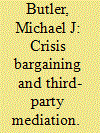

|
|
|
|
|
| Publication |
2007.
|
| Summary/Abstract |
The intersection of the study of bargaining and international crisis has proven a fertile area of inquiry that has notably excluded third-party mediation. This research chronicles this omission from the crisis bargaining literature, and seeks to identify whether mediation as a form of international crisis behavior merits inclusion in that literature. In conducting an empirical analysis of third-party mediation in international crisis, this study finds that mediation is in fact a prominent feature of international crisis, with the likelihood of mediation greatly increased in crises featuring a high overall level of violence as well as in crises of a military-security nature. On the basis of these empirical findings, this study concludes that third-party mediation is deserving of more systematic attention by scholars of crisis bargaining, offering suggestions for future inquiry to that end
|
|
|
|
|
|
|
|
|
|
|
|
|
|
|
|
| 4 |
ID:
175820


|
|
|
|
|
| Summary/Abstract |
As more women attain executive office, it is important to understand how gender dynamics affect international politics. Toward this end, we present the first evidence that gender stereotypes affect leaders’ abilities to generate audience costs. Using survey experiments, we show that female leaders have political incentives to combat gender stereotypes that women are weak by acting “tough” during international military crises. Most prominently, we find evidence that female leaders, and male leaders facing female opponents, pay greater inconsistency costs for backing down from threats than male leaders do against fellow men. These findings point to particular advantages and disadvantages women have in international crises. Namely, female leaders are better able to tie hands—an efficient mechanism for establishing credibility in crises. However, this bargaining advantage means female leaders will also have a harder time backing down from threats. Our findings have critical implications for debates over the effects of greater gender equality in executive offices worldwide.
|
|
|
|
|
|
|
|
|
|
|
|
|
|
|
|
| 5 |
ID:
160532


|
|
|
|
|
| Summary/Abstract |
Uncertainty about resolve is a well-established rationalist explanation for war. In addition to estimating the resolve of immediate rivals, leaders choose their actions in a crisis based on expectations about how third parties will respond. We argue that leaders will become more likely to develop inconsistent estimates of rivals’ relative capabilities and resolve – and thus will become more likely to fight – when domestic political changes occur in states that are allied with an opponent. We also consider how the relationship between conflict in rivalries and third-party domestic change depends on domestic political institutions in the third party. We argue that this effect should only hold when a challenger does not also share an alliance with the third party, and that the effect should be strongest when the third party is a non-democratic state. We test our theory using a dataset of changes in leaders’ domestic supporting coalitions and data on militarized interstate disputes from 1920 to 2001. Consistent with our hypotheses, we find that the likelihood of conflict increases in rivalries only when domestic coalition changes occur in states that share an alliance with only one member of a rivalry, and that this effect is strongest and most consistent for non-democratic third parties.
|
|
|
|
|
|
|
|
|
|
|
|
|
|
|
|
| 6 |
ID:
119955
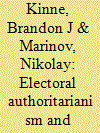

|
|
|
|
|
| Publication |
2013.
|
| Summary/Abstract |
How, if at all, do nondemocratic elections affect credible signaling in international crises? While the literature on credible signaling emphasizes the importance of electoral competition, it does not specify the minimal conditions that elections must satisfy in order to enhance the credibility of threats. We address this oversight by focusing on two fundamental properties of electoral institutions: (1) the degree of proincumbent bias and (2) the vulnerability of the incumbent to a de facto loss of power following an opposition victory. Our theory argues that both decreases in electoral bias and increases in incumbent vulnerability introduce greater accountability into the electoral process and thus enhance the credibility of public threats, even when elections fail to meet basic democratic standards. We apply these insights to the case of electoral authoritarianism, that is, regimes in which some form of electoral competition exists but basic principles of democratic governance are commonly violated. Using data on reciprocation rates in militarized crises, We show that, so long as electoral biases are sufficiently low and incumbent vulnerability is sufficiently high, even electoral authoritarian regimes are able to credibly signal resolve.
|
|
|
|
|
|
|
|
|
|
|
|
|
|
|
|
| 7 |
ID:
182703


|
|
|
|
|
| Summary/Abstract |
The claim that President Donald Trump’s “fire and fury” pressure campaign coerced North Korea to return to the bargaining table has renewed debates about coercion among nuclear powers. This article contributes to these debates by refining our understanding of the 1969 Sino-Soviet border crisis. Drawing on Romanian archival documents and Chinese-language sources, this article challenges the assertion that Soviet nuclear threats coerced the Chinese to return to the bargaining table. Further, it explains China’s otherwise puzzling intransigence when border negotiations resumed. After China’s leaders agreed to return to the bargaining table, they became fearful of a Soviet nuclear attack and fled Beijing; despite this fear, however, the Chinese resisted a border deal for decades. Why did the fear of a Soviet nuclear attack fail to compel the Chinese to accept a border deal? By improving our understanding of the 1969 crisis, this article sheds new light on the conditions under which nuclear compellence succeeds.
|
|
|
|
|
|
|
|
|
|
|
|
|
|
|
|
| 8 |
ID:
091033
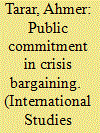

|
|
|
|
|
| Publication |
2009.
|
| Summary/Abstract |
The "audience cost" literature argues that highly-resolved leaders can use public threats to credibly signal their resolve in incomplete-information crisis bargaining, thereby overcoming informational asymmetries that lead to war. If democracies are better able to generate audience costs, then audience costs help explain the democratic peace. We use a game-theoretic model to show how public commitments can be used coercively as a source of bargaining leverage, even in a complete-information setting in which they have no signaling role. When both sides use public commitments for bargaining leverage, war becomes an equilibrium outcome. The results provide a rationale for secret negotiations as well as hypotheses about when leaders will claim that the disputed good is indivisible, recognized as a rationalist explanation for war. Claims of indivisibility may just be bargaining tactics to get the other side to make big concessions, and compromise is still possible in equilibrium.
|
|
|
|
|
|
|
|
|
|
|
|
|
|
|
|
| 9 |
ID:
167283
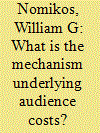

|
|
|
|
|
| Summary/Abstract |
Audience cost theory posits that concern over the nation’s reputation pushes voters to sanction leaders who make empty threats because they tarnish the nation’s honor. We question the empirical support for that theory. We show that survey vignettes in the previous experimental literature conflate audience costs generated by inconsistency and belligerence with approval losses arising from the perception that the leader is incompetent. These ‘incompetence costs’ are due to leaders not achieving audiences’ preferred outcomes. Our article contributes to the literature on audience costs by disentangling inconsistency and belligerence costs from incompetence costs, which we find are the larger component of audience costs. We also make a methodological contribution: we show that experimental designs in previous studies cannot test the different mechanisms; that previous estimates of audience costs are biased because treatments affect respondents’ beliefs about the likely outcome of policy actions; and we suggest a new experimental framework to estimate audience costs. Our results are consistent with arguments that audiences care more about policy outcomes than about leaders’ inconsistency or belligerence during a crisis.
|
|
|
|
|
|
|
|
|
|
|
|
|
|
|
|
|
|
|
|
|